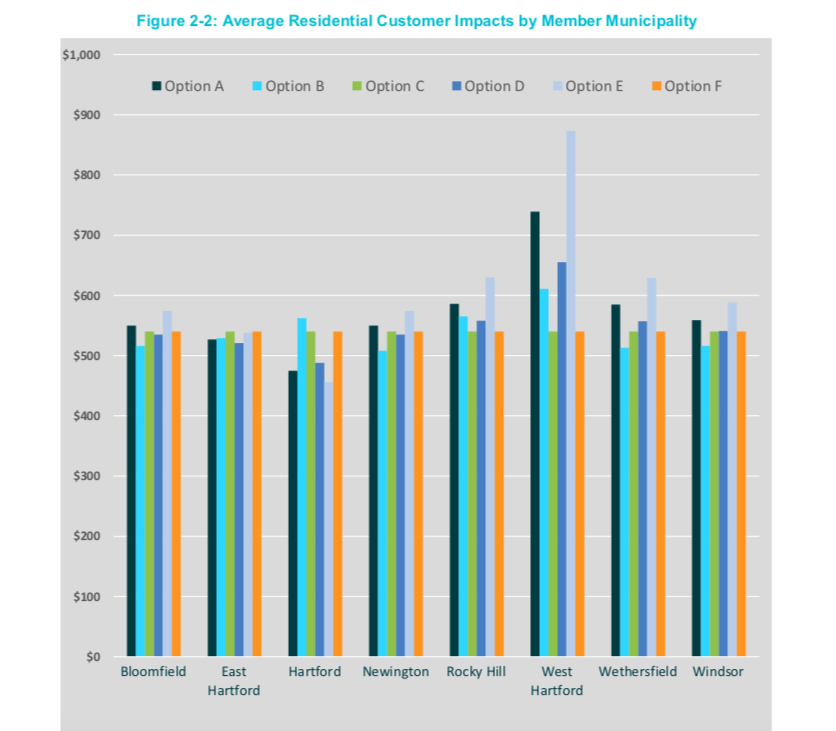West Hartford Town Council to MDC: It’s Time to Eliminate Ad Valorem Tax

Audio By Carbonatix

Average residential customer impact by member municipality. Option C, in green, is what is being recommended by the West Hartford Town Council, and what best meets the study's goals. From Metropolitan District Commission, Feb. 26, 2019 Sewer User Fee Study
The West Hartford Town Council unanimously approved a resolution Monday night, sending a strong message to the Metropolitan District Commission that the current ad valorem tax system is unfair, and urging other member towns to join in the request for a change. [Updated April 17, 11:55 a.m.]
By Ronni Newton
The West Hartford Town Council is not just making a suggestion with the resolution approved unanimously Monday night and sent to the Metropolitan District Commission (MDC), but rather sending a strong message that, according to its own study, the current “modified ad valorem” method of charging for sanitary sewer service is unfair and disproportionate and should be changed.
Included in the resolution is a request that the other seven MDC member towns join West Hartford in the request for change.
The MDC, at the urging of West Hartford and other member towns, commissioned the “Sewer Usage Charge Study” which was completed and submitted by Raftelis Financial Consultants, Inc., on Feb. 26, 2019, Town Manager Matt Hart said. The last time a study had been done was by Coopers & Lybrand in 1998.
The recently-completed study examined six different options for funding sewer usage. In the resolution, the town is requesting that the MDC implement Option C, which is a user fee based on water consumption. The town also requests that the MDC “[d]evelop a detailed model for a user fee system consistent with federal regulations, including the establishment of a low income user fee; and [d]etermine a schedule by which conversion to a user fee system could be completed.”
It’s a complicated issue, Mayor Shari Cantor said at Monday night’s Town Council meeting, but under the current method the MDC uses to charge for sanitary sewer service, costs will increase 8.1 percent, or about $860,000, for the next fiscal year.
The cost has risen dramatically over the past several years, from about $7.1 million in 2012 to about $11.5 million for the upcoming fiscal year. The amount is roughly equal to what the town budgets for the entire fire department, Cantor said.
West Hartford joined the MDC in 1984, with seven other member towns – Bloomfield, East Hartford, Hartford, Newington, Rocky Hill, Wethersfield, and Windsor. The MDC currently charges for water based on a user fee (billed to customers based on actual consumption of water that flows through the tap), and in assuming the town’s sewer liabilities, began charging for that on an ad valorem basis – a completely different methodology.
The MDC, however, doesn’t actually use a standard ad valorem charge which would be based on assessed property values, but rather bases its fee allocation – mandatory charges which are essentially a tax that a member town must pay – on the average of the last three years of property taxes collected, Cantor said.
The MDC’s expenses are divided among the eight member towns according to that formula, and the redistribution of property values along with the town’s successful collection of its property taxes has resulted in West Hartford carrying a share of nearly a quarter of the MDC’s expenses, Cantor said.
“People don’t understand that there is this driver that they don’t really see or know,” Cantor said. The MDC charges equate to almost 2 mills – or nearly 5 percent – of the town’s overall tax rate. And because of changes in the federal tax laws, the amount of state and local tax that can be deducted is capped, further increasing the burden for many residents.
Any behavioral changes among residents to conserve water would impact a user fee, but will not in any way impact an ad valorem charge.
“There are very, very few sewer systems that use an ad valorem system,” Cantor said.
The ad valorem system is antiquated, and was actually outlawed in the 1970s, but the MDC was grandfathered and allowed to continue the method, Cantor said. More than 80 percent of sewer authorities nationwide have a user fee system.
There are many problems inherent with the existing ad valorem system, including discrepancies between how effectively a town collects its taxes and the fact that Hartford’s residential tax rate is assessed based on 30 percent of a property’s value, while West Hartford and other towns assess at a 70 percent rate.
“Other systems have a low income rate so that would be subsidized,” Cantor said, but ad valorem doesn’t allow for that type of subsidy, which could help low income residents in all member towns.
Transitioning to a user fee would also eliminate the possibility that bankruptcy by a member town would result in a mandatory assessment of the other towns. In 2017, amid uncertainty in state aid for FY2018, West Hartford was facing a reserve of $1.78 million in case Hartford defaulted on its payment to the MDC.
Major investment is needed in the storm water system, and work will be required over the next several decades, but Cantor said it’s hard for the town to even consider deploying more resources to work with the MDC on that project.
Hart and West Hartford Chief Financial Officer Peter Privitera have been attending MDC budget meetings, and feel that having produced the Sewer User Charge Study is not a final solution, but the starting point for further discussion, Cantor said.
Hart said Option C in the Raftelis study best meets the study’s own evaluation criteria, which include equitable cost recovery and revenue stability.
Under the current system, the average property owner in West Hartford pays $265 more per year for sanitary sewer service than they do in Hartford.
Hart said that a user fee is “most consistent with industry standards and federal standards set by EPA,” and Raftelis agrees.
In addition, a low income rate, which is permitted by federal regulations, could be established to assist users across the district.
A user fee would also provide budgetary relief for the town, removing the sewer cost – which Hart said has increased 45 percent since 2007 – from taxes. “We could use a portion of those monies to invest in our storm water infrastructure,” Hart said.
According to the study, at current usage levels town residents would save a cumulative $2.5 million, or 12 percent, by moving to a user fee.
Council member Dallas Dodge said that MDC costs are a factor in the “economic competitiveness” of member towns, and something that we have to bear in our mill rate that other nearby towns that are not members don’t have.
In addition, Dodge noted the “core problem of the system is that there is a lack of transparency and accountability of the MDC on a political level.” The MDC commissioners are tasked with a responsibility that has an enormous impact on the finances in town, but most residents don’t even know who they are.
Transparency and accountability for the end user is also not present because they don’t get a bill for their sewer usage, which is “out of whack with industry best practices. … I think that going to a user fee is common sense. I think most of the country has figured out that’s common sense,” Dodge said, and it’s time for the MDC to do the same.
Minority Leader Chris Barnes thanked Cantor for the time she spent studying these issues, something that the Council has been discussing for a long time.
“Clearly there is an inequitable system that’s in place,” particularly as it relates to West Hartford, Barnes said. “It’s unsustainable and I think the MDC knows it.”
Barnes said he doesn’t know how, at this point, the MDC can avoid considering the study. “[This is] really an effort on shining a light on something that has been in the dark recesses of our town budget for way too long,” he said.
Councilor Leon Davidoff said that the resolution is the appropriate mechanism for making a statement to the MDC, is backed up by the study that they commissioned, and recommends the option that would benefit most of the users and member towns, particularly if a low income provision is included.
“My only concern is that we have done resolutions to MDC before and that it sits in a pile. … I’m confident that this particular proposal will be listened to,” said Davidoff. “This is unsustainable and has been unsustainable for years,” and if it is not successful, requesting action from the general assembly would be the next logical step.
Deputy Mayor Beth Kerrigan praised Cantor’s aggressive approach to the MDC, and said that she was shocked when she learned how much more it “costs to flush the toilet in this town.”
Kerrigan said she is pleased that the resolution is bipartisan and that councilors agree that the current ad valorem approach is unfair to the citizens of West Hartford. She said that she is “feeling very hopeful for the future.”
Councilor Liam Sweeney said that regionalizing a service – like through the MDC – should lead to equity. When the MDC was created it should have been about equity and to save collectively, he said, and right now it’s clear that West Hartford is paying a disproportionate share of costs, which is “not fair to the folks that have bought houses here.”
Councilor Ben Wenograd said he also appreciates the bipartisan nature of the resolution, adding that he was initially skeptical and concerned that “equity” might eliminate the progressive nature of the MDC charge. “But if you look at this system it’s become very apparent that this is not a good system,” he said, and it also doesn’t incentivize people to use less water.
Cantor thanked Corporation Counsel Pat Alair for the extensive amount of work he put into researching and helping draft the resolution.
“We are going to send this adopted resolution to all member towns,” Cantor said. A user group meeting is scheduled for the end of April, and she expects the resolution to be discussed at that time, and not just sit on a shelf.
“We’re committed to ensuring that won’t happen,” Cantor said.
“We appreciate West Hartford’s position on the sewer use charge. We look forward to our meeting on April 29 with representatives from all of our member towns where we will be discussing all of the options that are contained in the final report of our Sewer User Charge Study,” R. Bartley Halloran, district counsel for the MDC, said in a statement on Wednesday. “The MDC’s main concern is ensuring that whatever system is in place to pay for the sewer services provided to our member towns, whether ad valorem, sewer use ratepayer charges, or a combination of both, that the fees are equitable for all ratepayers and member towns.”
A complete copy of the Town Council’s resolution can be found below as a PDF.
To read the MDC’s Feb. 26, 2019, Sewer User Fee Study, click here.
Editor’s Note: This story was updated on April 17 with a statement from the MDC.
Like what you see here? Click here to subscribe to We-Ha’s newsletter so you’ll always be in the know about what’s happening in West Hartford!
 Loading...
Loading...




So, if I have this straight: water is a bill direct to the customer and sewer is an ad valorem pledge from the town. Here is an issue I see with the request to change the ad valorem pledge, and if anyone can enlighten me, please do so. There are municipal bonds backed by the ad valorem pledge of the MDC as well as those back by revenues of the MDC. I assume that these are the two separate and distinct pledges. I don’t understand how the ‘ad valorem’ pledge of the MDC can be changed before all outstanding debt is retired? Thanks for any guidance offered
Feels like a bait and switch for the Town Council to move the sewage bill I to the residents lap and to confiscate the taxes for something else.
Ding ding ding! Could not agree more.
According to the article, the MDC charge is 5% of our tax bill. It is delusional to think our taxes will go down 5% if the MDC goes to a sewer use charge. That money will go straight to the BOE budget (most likely), and us residents will have yet another bill to pay.
[…] of the budget is fixed costs, Dodge said, and one cost increasing at an irresponsible rate is the MDC ad valorem charge. West Hartford is uniquely affected and ends up subsidizing other towns, and “that’s a […]